Ukraine war: Helpless, bound, Bucha’s men were shot in head or chest
The men of Bucha were tortured before being shot while women were beaten by retreating Russians | DISTRESSING CONTENT
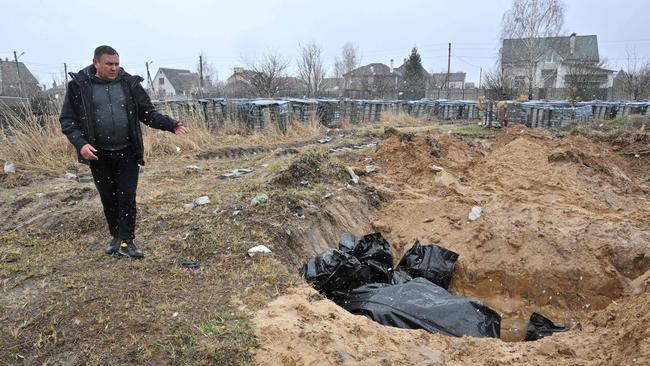
Behind the pink-tiled building, sandbagged with cement sacks by Russian soldiers, the men lie still and silent as snow falls softly. One has his hands tied behind his back with army boot laces; another with plastic tape wound round and round his wrists. A third has his ankles bound with electrical cable, an empty Russian ration box by his side. All of their shoes are missing.
Inside the filthy, rubbish-strewn building where the soldiers made their camp, a small black puppy sits on a sofa, oblivious to the horrors outside. Why these eight men, all in civilian dress and shot through the head and chest, were killed is yet another conundrum for police and investigators newly arrived in Bucha after Ukrainian soldiers recaptured it from Russian occupiers.
The town is hardly short of such puzzles. When Ukrainian soldiers first drove in here, their vehicles were forced to swerve to avoid civilian bodies littering its broken streets. Yesterday the bodies were being collected, zipped into black body bags or flung unshrouded into a mass grave behind the golden onion domes of St Andrew’s Church. Officials said that it held 280 dead and counting.
As the Ukrainian military picks through devastated buildings for unexploded ordnance, a catalogue of horror suggesting widespread war crimes is emerging, a grim predictor of what may yet be found in towns and cities under Russian control or siege.
Bucha was one of the early targets in Russia’s attempted assault on Kyiv, called off by the Kremlin last week to refocus efforts on the south and east of Ukraine. The Russians arrived so swiftly that many, especially the elderly, had no chance to flee or did not believe that what was to come would be so grim.
“They arrived in a column of tanks and it looked like something out of the Second World War,” Svetlana Klyumchyk, 46, a housewife said. “They were young and mostly stayed away from us. Later they started coming to our houses and demanding: where are the Nazis?”
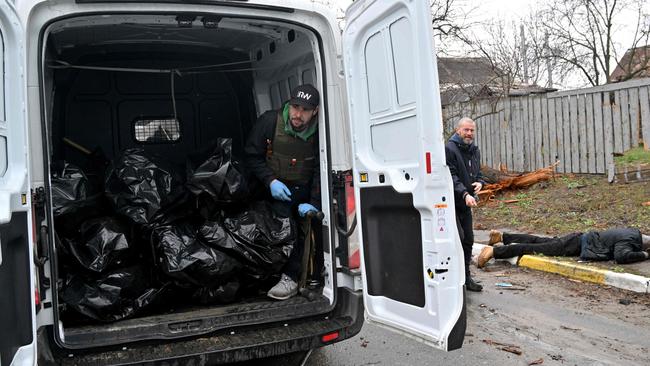
The first wave of Russians took over commercial buildings and abandoned apartment blocks and houses. But as the Ukrainian counteroffensive gathered pace, the occupiers grew increasingly paranoid, targeting male civilians in the belief that they were helping to inform on Russian positions or otherwise working against them.
“They captured me and tortured and interrogated me,” Volodymyr Ivanov, 40, a sports equipment salesman, said, his hands shaking, his breath scented with vodka as he queued for food handouts. “They stripped my clothes to look for tattoos, Nazi or nationalist, even though there was nothing to find.”
Men started to hide in their houses and women went instead to fetch water or seek permission to light fires to cook after electricity and gas were cut off.
Tetyana Zabarylo, 40, was beaten with the butt of a Kalashnikov rifle by soldiers who stole her phone. An angry purple bruise is beneath her eye, barely covered by makeup. “Tell Nato thank you for not closing the sky,” she says bitterly, a reference to Ukraine’s repeated pleas for a no-fly zone.
She does not know yet how many neighbours she has lost. “We have had no communication for weeks,” she said. “It’s hard to tell who is dead and who escaped. Tell us, what does the world think of what is happening?”
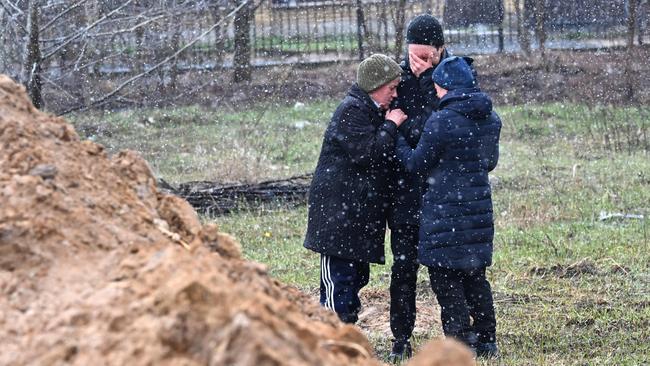
Stanislav Polukhin, 34, a special police battalion commander, was first sent to Bucha two weeks ago amid heavy fighting to help extract civilians as the military pushed forward. Despite what he had been told, the Russian soldiers’ behaviour still shocked him.
“They used civilians like bait,” Polukhin says. “They taped white tapes on their arms and told the people, just go there. They are civilians. When our military, our forces, see the people with the white tape, they identity them as enemy. And that is what they wanted.”
Yesterday (Sunday) afternoon police and soldiers picked their way through a recreational summer camp where children came to enjoy forest surroundings, playing sports through the summer.
Mattresses were pulled from stores and used as protective barriers against windows, while others were lined on the floor where soldiers slept.
In a basement below a dormitory, there was another grisly discovery: the bodies of five men, each with a single bullet wound. An explosives team checked them, fearful of booby traps. “We have found that already in Irpin,” one soldier explained. “They rig the dead with mines to kill those who come to recover them.”
Police believe the victims were maintenance staff, captured when the camp commandeered it and killed before the Russians pulled out.
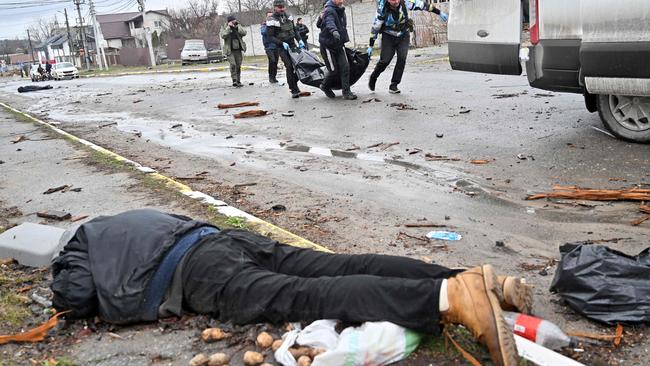
Moscow’s attempt to launch a large-scale assault on Kyiv is the stuff of strategic disaster, plagued not only by jaw-dropping logistical failure and a dismal understanding of the Ukrainian psyche but also by the unequal battle between clanking Soviet armour and western technology gifted by Britain and the US. On a back road from Kyiv to Irpin, the detritus of a pitched battle between Russian tanks and Ukrainian-held anti-tank missiles tells its own story.
The shrunken, charred corpse of a tank commander is visible in his shattered vehicle, its turret uselessly on one side. Ukrainian officers, coming to join their comrades in Bucha, stop their cars and take gloating selfies.
Bucha lies to the northwest of Kyiv, just beyond Irpin, the site of ferocious shelling and fighting as Russian troops struggled to advance towards the capital after Ukrainian troops blew up the bridge across the Irpin river to halt them where they were. Last week President Zelensky hailed Irpin as Ukraine’s first “hero city” of the invasion after it was liberated from Russian control.
Yesterday, after more of Bucha’s horrors began to emerge, Zelensky struck a more furious note, accusing President Putin of genocide. “This is about the elimination of the whole nation and the people,” he said. “We are the citizens of Ukraine and we don’t want to be subdued to the policy of Russian Federation. This is the reason we are being destroyed and exterminated.”
The litany of horrors in Bucha are repeated in newly liberated settlements around Kyiv. There are reports of mothers raped in front of their children, fleeing families murdered in their cars and men of military age executed.
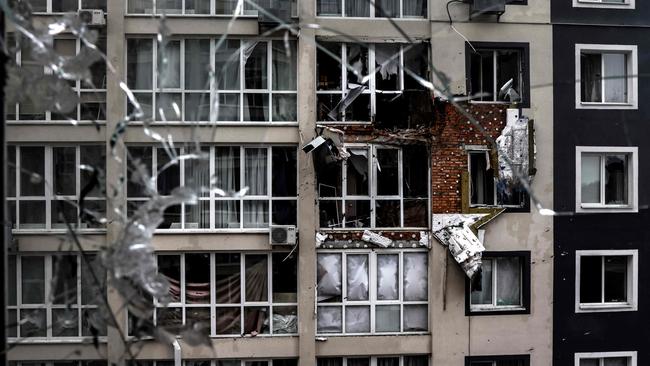
Russia’s defence ministry denied any part in the alleged atrocities in Bucha, saying photographs and videos from the scene were “the latest fabrication of the Kyiv regime for western media, as with the maternity hospital in Mariupol, and in other towns”.
The ministry said the corpses in the footage had, suspiciously, not turned rigid, had “uncoagulated blood in the wounds” and did not bear the skin discolouration associated with cadavers. It claimed that Russian forces had left the area on March 30, adding that Anatoly Fedoruk, the mayor, had confirmed the departure in a video on March 31 without mentioning any executions.
“For that reason, it is not surprising that the so-called evidence of crimes in Bucha only appeared four days later when officers of the SBU [Security Service of Ukraine] and representatives of Ukrainian television arrived,” it said. “Not a single resident was hurt by violent action while this town was under control of the Russian armed forces.”
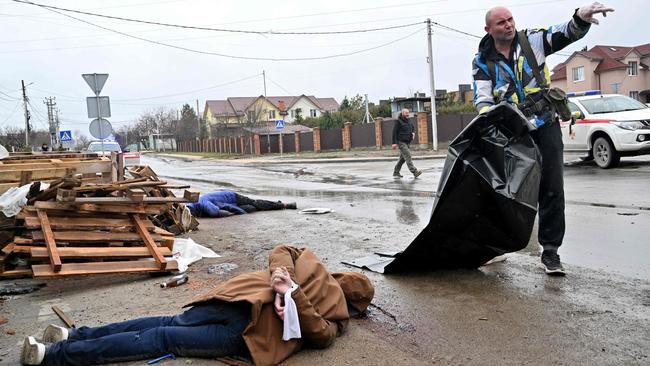
The ministry also claimed that Ukrainian forces had shelled the southern outskirts of Bucha “non stop”, while Russian forces had not prevented locals leaving to the north.
In Irpin, Mikhail Khyshchynskyi, 43, returned home to face what Russian soldiers had left behind when they ransacked his townhouse. His white Volvo, commandeered by Russian soldiers, had been brought back by neighbours who had remained. It is spray-painted with a black V, the signature of Russian forces assaulting Kyiv.
“I came here from Kyiv for a quiet life,” he said. “It’s a shock, really, all of it.” His neat garden was strewn with empty bottles of wine and spirits and every drawer in the house had been tipped out. “They drank every bit of alcohol in every house,” he said. “Maybe 1,000 bottles of whisky and vodka in this neighbourhood. Jewellery, computers, cash – all gone.”
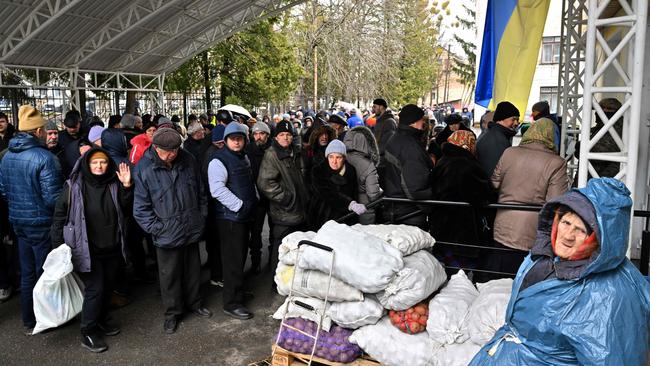
Polukhin was equally disgusted with what he found in abandoned Russian quarters in Bucha. In the pink-tiled headquarters of a state building supplies company, the basement was littered with bottles filled with urine by the soldiers as fighting raged. Empty ration tins and packets lay around the dead men and inside the building, perhaps attracting the black puppy – luckier than many of Bucha’s abandoned pets.
“They slept with all this trash all around. They are disgusting,” Polukhin said. “There are so many stray animals in the city. They have no food and they started to eat the bodies of dead people. After that they start to be aggressive and to attack the soldiers.” Polukhin and the 60 men under his command stayed in a damaged and abandoned apartment block. “Some of us wrote a note saying we are police officers, we are temporarily based here and we are sorry, we tried not to break anything,” he said. “We will not stay any longer than we have to.”
As for the Russians’ plans, he said: “I understand they want to focus elsewhere. They were not able to get a big success in this area. When people ask what is your forecast for what Putin will do, I say I don’t know, nobody knows what one mad person has in his mind.”
Much has been made about the low morale among the Russians and the way their own commanders have failed them, both in battle planning and because they have rarely tried to recover their troops’ bodies. Their atrocities in Bucha leave little room for pity, only the hope that their defeat will be final.
“The civilians told us when they were retreating from this place the Russian soldiers were very exhausted,” Polukhin said. “They spent a long time in this place without enough food and they were exhausted.”
The Times


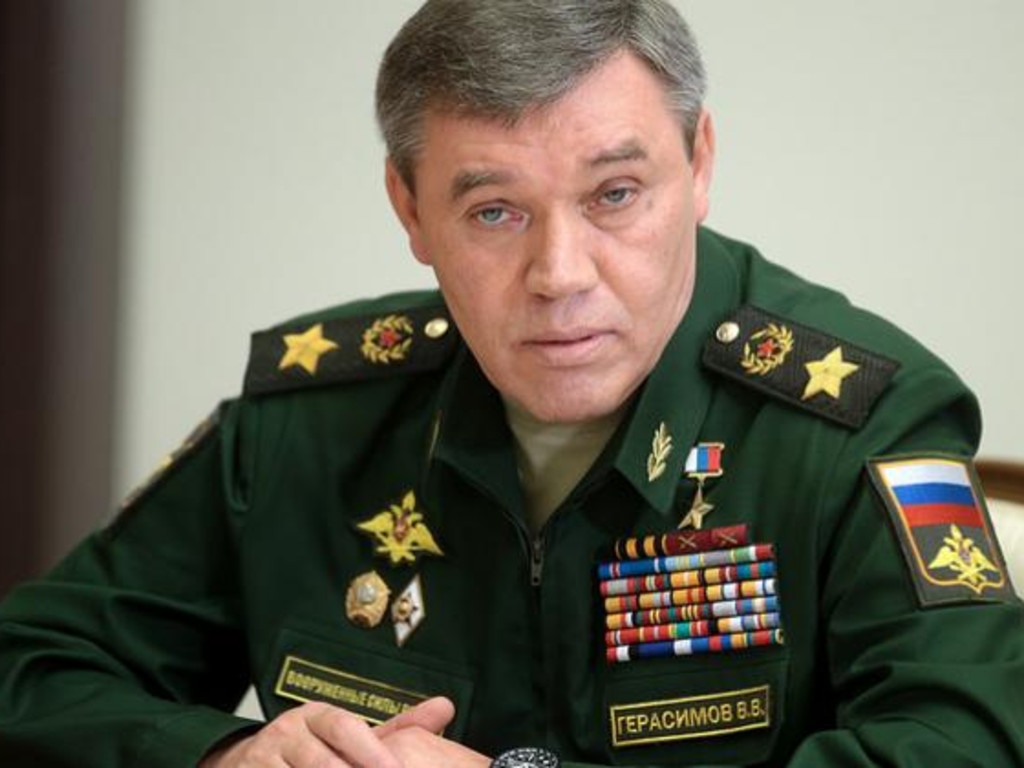

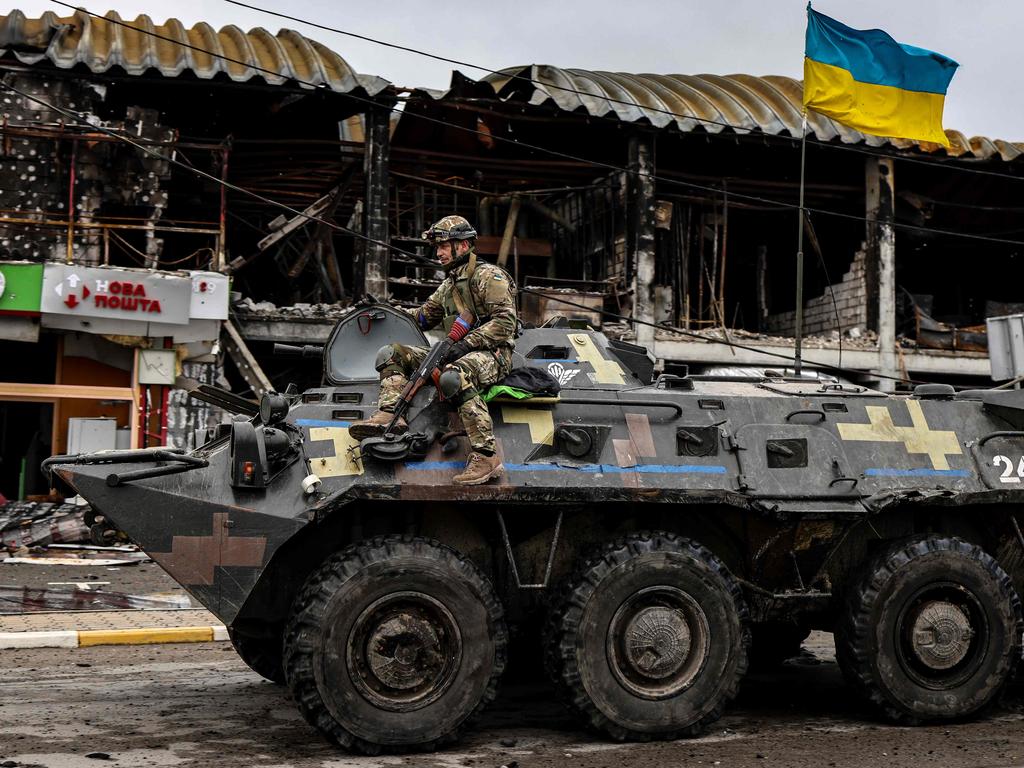


To join the conversation, please log in. Don't have an account? Register
Join the conversation, you are commenting as Logout